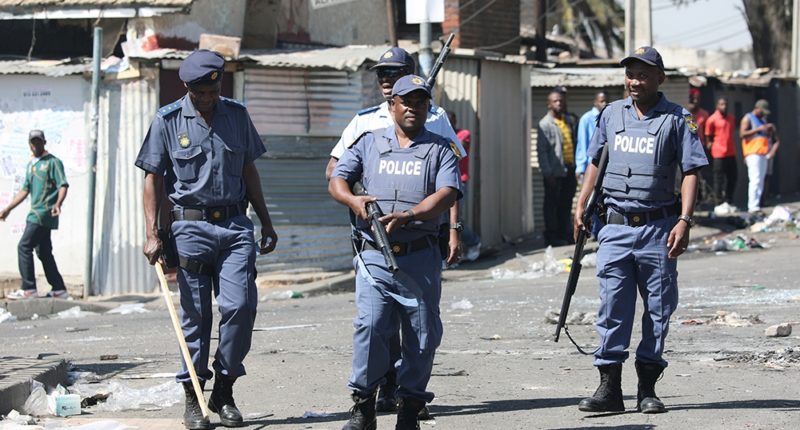Five people have been killed in xenophobic attacks in South Africa, police said, as President Cyril Ramaphosa vowed to clamp down on what he described as “acts of wanton violence” and the African Union and Nigeria sounded the alarm.
Police fired rubber bullets and arrested 189 people in the township of Alexandra on Tuesday, a day after clashing with looters who local media said targeted foreign-owned businesses in several parts of the city.
Most of the deceased were South Africans, police said.
“I’m convening the ministers in the security cluster today to make sure that we keep a close eye on these acts of wanton violence and find ways of stopping them,” he said in a post on Twitter.
“There can be no justification for any South African to attack people from other countries.”
Rocks, bricks and rubber bullets strewed the empty streets of Alexandra on Tuesday, and Al Jazeera reporters at the scene saw police firing rubber bullets at a crowd of 50 people who were hurling rocks.
About two dozen shops, owned by both foreigners and locals, were vandalised or looted.
“They burnt everything,” Bangladeshi shopowner Kamrul Hasan told AFP news agency in Alexandra, adding that his shop gets attacked every three to six months.
“All my money is gone. If the [South African] government pays for my plane ticket, I will go back to Bangladesh,” the 27-year-old said.
Lungelo Dlamini, a spokesman for police, said the motive behind Tuesday’s riots was not clear.
“They are just criminals who are looting and taking advantage of the situation,” he told Al Jazeera.
Police arrested more than 91 people on Monday after protesters torched cars and looted dozens of shops.
News24, a South African news agency, said Monday’s riots came after hundreds of people marched in Johannesburg’s Central Business District (CBD) demanding foreigners leave. They targeted “shops they believed to be owned by foreign nationals”, it reported.
Meanwhile, Nigeria‘s Foreign Minister Geoffrey Onyeama reacted strongly to the scenes of violence on Monday.
“Received sickening and depressing news of continued burning and looting of Nigerian shops and premises in #SouthAfrica by mindless criminals with ineffective police protection,” he said on Twitter. “Enough is enough. We will take definitive measures.”
In 2015, Nigeria had recalled its ambassador to South Africa following a spate of attacks against immigrants.
But South African Police Minister Bheki Cele dismissed reports the ongoing attacks were xenophobic.
“Xenophobia is just an excuse that is being used by people to commit criminal acts,” he told reporters on Monday afternoon. “It is not xenophobia, but pure criminality.”
In a statement on Monday, the South African Human Rights Commission said it was “deeply concerned by violence, looting, arson and vandalism plaguing much of Johannesburg”.
South Africa is a major destination for economic migrants from other parts of the continent, including the Southern Africa region, with many moving from neighbouring Lesotho, Mozambique and Zimbabwe in search of work.
The unrest started on Sunday when an old building in the CBD caught fire and collapsed, killing at least three people. It then spread to two eastern suburbs and to the executive capital, Pretoria, where local media reported shops burning in Marabastad – a central business area largely populated by economic migrants.
Last week, hundreds of protesters in Pretoria set fire to buildings, looted mostly foreign-owned businesses and clashed with police, who fired rubber bullets at the crowds. The chaos broke out after local taxi drivers clashed with alleged drug dealers in the area, according to the Sowetan newspaper.
On Monday, a pamphlet circulating on social media, seen by The Associated Press news agency, encouraged South Africans to chase foreigners out of their communities.
The pamphlet, attributed to a group called the Sisonke Peoples Forum, accused foreigners living in South Africa of selling drugs and stealing jobs, both common refrains during the regular flare-ups of violence against foreigners in the greater Johannesburg area in recent years.
The main opposition Democratic Alliance party said: “These incidents are due to a failing economy in which more than 10 million South Africans cannot find work.”
Both the ruling African National Congress and the Democratic Alliance have been accused of stoking xenophobia.
The violence comes amid a wave of protests in the transport industry linked to anti-foreigner sentiment.
Zambia‘s government on Monday called on Zambian truck drivers to avoid travelling to South Africa and those already in the country to park their vehicles “until the security situation improves”.
Truck drivers in the southeastern province of KwaZulu-Natal (KZN) started a nationwide strike on Sunday to protest against the employment of foreign drivers. KZN police said 11 trucks blocked the road to Richards Bay Harbour, one of the deepest natural harbours in Africa.
They told AFP news agency that at least four vehicles had been torched.
At least 20 people had been arrested “in connection with incidents related to protests within the trucking industry”, KZN police said.
Lieutenant-General Khombinkosi Jula, chief of police for KZN province, said they had intensified patrols along major routes.
Sipho Zungu, chairman of the All Truck Drivers Foundation, told AFP his group had had “nothing to do with the strike”, but stressed that it was fighting for the employment of South African drivers.
“People of South Africa are hungry, they are sitting at home.. while companies in South Africa are employing foreigners … [because] its cheap labour. We are hungry and angry,” Zungu told AFP.
The South African Transport and Allied Workers Union (SATAWU), which has over 200,000 members, also distanced itself from the violence.
South Africa’s Road Freight Association told local media in June that more than 200 people have been killed in attacks on foreign truck drivers since March 2018.
Source: AL JAZEERA AFRICA





